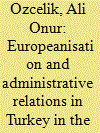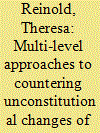| Srl | Item |
| 1 |
ID:
139397


|
|
|
|
|
| Summary/Abstract |
This article sheds light on the complexity of international climate change negotiations in a federal country, like Canada, where there is no clear attribution of full power over international negotiation concerning this issue. Climate change is a multi-level and multi-stakeholder issue, one that can only be tackled successfully if all actors, at all levels of government, are involved in the process. In recent years, Canadian provinces, especially Québec, have become intensely involved in climate change paradiplomacy. That situation has led to a Canadian paradox where the Government of Québec worked to respect the Kyoto Protocol and act accordingly, while Canada opted out of the Protocol in 2011.
|
|
|
|
|
|
|
|
|
|
|
|
|
|
|
|
| 2 |
ID:
169219


|
|
|
|
|
| Summary/Abstract |
After the Helsinki Summit of 1999, Turkey faced the impact of Europeanisation in the context of regional policy and structural funds. This impact challenged the long-established statist tradition of the Turkish administrative structure and led to the need for reforms in order to bring its regional policy in line with European Union (EU) standards. The polity effect of Europeanisation in Turkey in the post-Helsinki era has been a change in administrative relations between three different territorial tiers: supranational, national and subnational.
|
|
|
|
|
|
|
|
|
|
|
|
|
|
|
|
| 3 |
ID:
167098


|
|
|
|
|
| Summary/Abstract |
This article assesses the impact of multi-level approaches to the problem of unconstitutional changes of government (UCGs) on the rule of law at the national and global level. Based on a single-case study of the 2016 Gambian UCG, this article concludes that multi-level governance tends to strengthen the rule of law at the national level, but only if certain conditions are met. These include an agreement about the rules of the road regulating how the different layers of governance interact – subsidiarity v. precedence for organizations from higher levels of governance – and the definition of a common purpose. Such unity of purpose is easier to attain if the (geo)political stakes of a crisis are relatively low, the prospects of success of a military intervention high, and if the perpetrators of the UCG have forfeited their legitimacy both locally and globally. This prevents them from exploiting institutional rivalries and shrinks their space for diplomatic manoeuvre and thus their ability to use forum shopping for their benefit. If these conditions are met, then multi-level responses to UCG will strengthen the rule of law at the domestic level, while at the same time potentially undermining the rule of law at the global level.
|
|
|
|
|
|
|
|
|
|
|
|
|
|
|
|